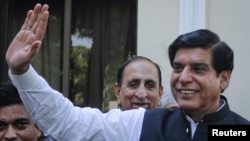Pakistani lawmakers have elected a new prime minister to replace ousted Yousuf Raza Gilani, in a bid to end the country's political crisis.
Parliament voted overwhelmingly Friday in favor of former water and power minister Raja Pervez Ashraf, who has been hit with corruption allegations and is partly blamed for the country's electricity crisis.
Ashraf won 211 votes in the 342-member national assembly. He is a member of the ruling Pakistan People's Party, which holds a majority in parliament with its coalition partners.
Sardar Mehtab Abbasi of the opposition Pakistan Muslim League - N received 89 votes.
Upon accepting the post, Ashraf urged the opposition to join with the government to help resolve problems such as the economy and the energy crisis. He also called on militants to lay down their weapons.
In response to the vote, the United States said it is pleased that Pakistan's leadership issue is settled and looks forward to working with the new government.
Pakistan's Supreme Court triggered the political crisis when it confirmed a ruling Tuesday that Gilani was ineligible for office. The court previously found him guilty of contempt for refusing a judicial order to ask Switzerland to investigate claims of corruption against President Asif Ali Zardari.
Even before this week's developments, Zardari’s government had been reeling from a combination of rolling power blackouts, rising unemployment, militant attacks and a tense relationship with the United States.
The Supreme Court's action marked the first time a Pakistani prime minister was removed by the judiciary.
Members of the opposition and others who support the court welcomed the ruling, which they see as a gesture against corrupt and ineffective government. Others feel the court overstepped its boundaries.
Since Prime Minister Ashraf likely will face the same pressure to investigate President Zardari, a number of analysts are doubtful that the switch at top levels of the government will end the country's political standoff.
Parliament voted overwhelmingly Friday in favor of former water and power minister Raja Pervez Ashraf, who has been hit with corruption allegations and is partly blamed for the country's electricity crisis.
Ashraf won 211 votes in the 342-member national assembly. He is a member of the ruling Pakistan People's Party, which holds a majority in parliament with its coalition partners.
Sardar Mehtab Abbasi of the opposition Pakistan Muslim League - N received 89 votes.
Upon accepting the post, Ashraf urged the opposition to join with the government to help resolve problems such as the economy and the energy crisis. He also called on militants to lay down their weapons.
In response to the vote, the United States said it is pleased that Pakistan's leadership issue is settled and looks forward to working with the new government.
Pakistan's Supreme Court triggered the political crisis when it confirmed a ruling Tuesday that Gilani was ineligible for office. The court previously found him guilty of contempt for refusing a judicial order to ask Switzerland to investigate claims of corruption against President Asif Ali Zardari.
Even before this week's developments, Zardari’s government had been reeling from a combination of rolling power blackouts, rising unemployment, militant attacks and a tense relationship with the United States.
The Supreme Court's action marked the first time a Pakistani prime minister was removed by the judiciary.
Members of the opposition and others who support the court welcomed the ruling, which they see as a gesture against corrupt and ineffective government. Others feel the court overstepped its boundaries.
Since Prime Minister Ashraf likely will face the same pressure to investigate President Zardari, a number of analysts are doubtful that the switch at top levels of the government will end the country's political standoff.
Some information for this report was provided by AP, AFP and Reuters.






